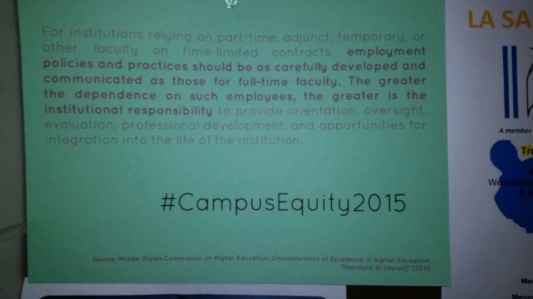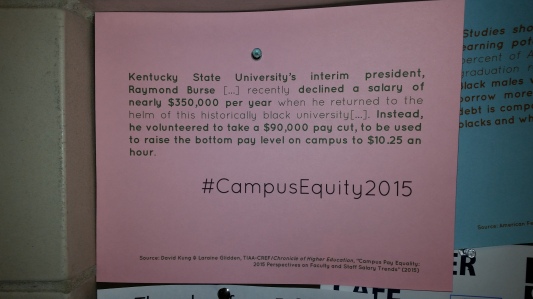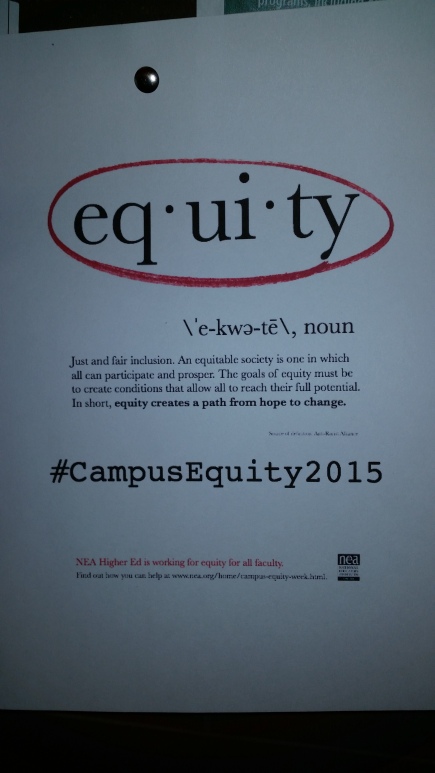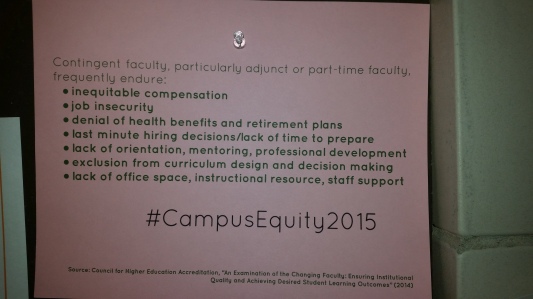Part-time adjuncts make up the majority of our faculty at La Salle, as is the trend across the country. As my contribution to this year’s Campus Equity Week, a perennial and national action devised in 2001 in order to address “working conditions of the majority of the faculty and the impact of those working conditions on the quality of education,” I created a series of posters calling attention to the low wages and career instability of adjunct faculty, and to other related effects on faculty and students of high ratios of adjunct hiring. I intended to follow established procedure for obtaining poster approval from Administrative Services, but the process requires the posters to be the work of a department, program, or some other official group on campus. There is no recognized adjunct support group on campus, no faculty group with a platform appropriate to the project, and I didn’t trust the ethics of seeking ad hoc astro-turfed support from any other organization. So, I posted fliers on campus property without first obtaining authorization.
This small act of civil disobedience, though not part of my original plan, does serve as an extension of the basic argument I have been making in conversations with faculty and administrative colleagues, and students, on and off campus. The argument is this: we have left the majority of our faculty, those most marginalized by policies enabled by economic expediency, institutionally voiceless. While they make up more than 50% of the faculty on campus, adjunct faculty appear only three times in our University Handbook: to define the low rank of part-timers, to clarify the lack of stability created by hiring too many part-timers, and to put them first on the chopping block when financial strain demands retrenchment. Because my goal is common effort and not division, it is important to note that my observation of these references, or of the lack of any positive mention of the rights or roles of adjunct faculty on our campus, is not to insinuate malicious intent, but to point to the regrettably pernicious effects of omission.
Without equal and codified access to the institution’s mechanisms for change and redress, our adjunct faculty have no true power. The good will and wrung hands of well-meaning administrators and faculty colleagues, myself included, are frankly not enough. Consequently, I am interested in doing more than bandying about a bromide or two, or sneaking pieces of paper onto the walls of this building or that. I have written and will submit to the Faculty Senate a summary report, which outlines the overwhelmingly exploitative conditions endured by adjunct faculty: low wages, unreliable and unstable work, lack of opportunity for development, lack of clear process in hiring and re-hiring decisions.
The report also asks for thorough study of the use of adjunct faculty across all departments and programs, partly so that we have a better understanding of why and where and how we hire adjuncts, but also with an eye toward amending the Handbook so that it more clearly satisfies standards of accreditation defined by the Middle States Commission on Higher Education. Specifically, Standard 10, which requires the following: “For institutions relying on part-time, adjunct, temporary, or other faculty on time-limited contracts, employment policies and practices should be as carefully developed and communicated as those for full-time faculty. The greater the dependence on such employees, the greater is the institutional responsibility to provide orientation, oversight, evaluation, professional development, and opportunities for integration into the life of the institution.” To date, we have failed to meet the specific recommendations of this standard. The Handbook includes a provision for data collection regarding faculty numbers, but the collection specifically excludes adjunct faculty figures: “These data shall include, listed by School and College, the numbers of tenured faculty, non-tenure track faculty, and one-year faculty appointments.”

I repeat here part of what I wrote in my report to the Senate: “It may be true that some adjunct faculty at La Salle perform their role in the traditional sense, as professionals and experts with careers outside academia hired to teach as needed; but many more are career teachers, who teach one or two courses at two, three, four colleges or universities for no better reason than financial efficacy. And those adjuncts, without whom many of our programs and departments could not succeed, deserve not only our sympathy but our action. The tradition of Catholic Social Teaching clearly insists on ‘a dictate of natural justice more imperious and ancient than any bargain between man and man, namely, that wages ought not to be insufficient to support a frugal and well-behaved wage-earner’ (Rerum Novarum no. 45).”
As a first step to giving institutional voice and power to adjunct faculty, I believe we must amend the Handbook so that all faculty know they have and receive recognition, access, and due process. But we must also put the morality of our mission into the moral document of our budget, ensuring livable wages for all who serve our students. And we must talk to each other, working together to fulfill our mission at home as we so often do in the wider world. If we are to remain Lasallian in more than brand and name alone, we must heed the call of that “dictate of natural justice,” we must do right by those whom Matthew calls “the least of these,” even if—especially because—we are in the midst of financial crisis.

Campus Equity Week 2015 is officially over, but I hope conversation about the alignment of mission principles and actual practice continues long after #CEW15 concludes, and that lasting, meaningful, equitable action follows. Whether adjunct, non-tenure-track, or tenure-stream faculty, whether full-time or part-time student, resident or commuter, whether office or service staff or high-ranking administrator, parent or trustee, Christian Brother or layperson, we all have an equal and abiding obligation to do right by every other member of this campus community.

